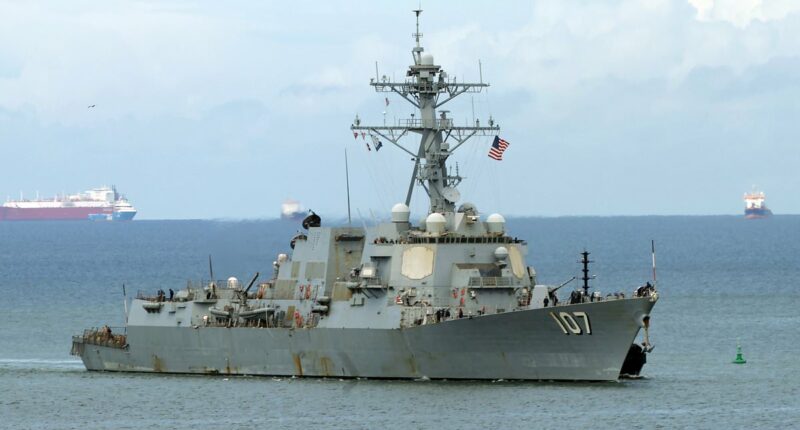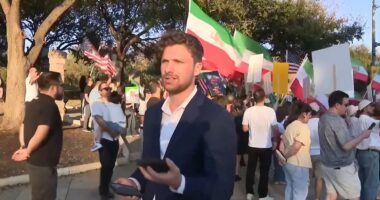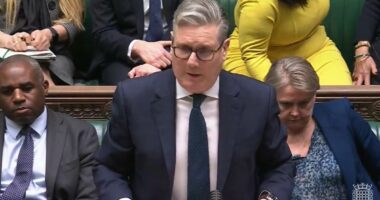Share this @internewscast.com
The Trump administration is reportedly planning to target military installations in Venezuela as part of a renewed effort against drug cartels. This strategic move marks a new chapter in the U.S. government’s ongoing battle against illegal drug operations.
Among the intended targets are naval and air bases, suspected of playing a crucial role in the large-scale drug activities of the notorious Tren de Aragua and Cartel de los Soles. These locations are believed to be key nodes in the cartels’ drug supply chains.
According to insiders who spoke to the Miami Herald, airstrikes could be imminent, potentially occurring within days or even hours. Those informed about the operation emphasized that time is running out for Venezuelan leader Nicolas Maduro’s regime.
“Maduro might soon find himself cornered, unable to escape the country even if he wishes to,” one source revealed. “The situation for him is dire, with multiple generals now prepared to detain and extradite him, understanding that discussing danger is far different from facing it directly.”
President Donald Trump, along with his senior officials, is concentrating efforts on undermining Maduro’s government, which they accuse of using the drug trade as a weapon against the United States.
Sources within the White House have identified Secretary of State Marco Rubio as the principal strategist behind this plan, viewing Maduro’s administration as a critical threat to U.S. interests.
‘You have a narco-state in Venezuela run by a cartel,’ he told reporters last week. ‘This is an operation against narco-terrorists, the al Qaeda of the Western Hemisphere … and they need to be dealt with.’
Trump has deployed the largest US force to the Caribbean since the Cold War and ordered 13 strikes on drug smuggling boats, killing at least 57 alleged cartel gangsters.

A member of the Bolivarian Militia holds a weapon during a rally amid rising tensions with the United States, in Caracas, Venezuela, on Thursday

Trump has been striking ‘narco-terrorist’ boats operated by Venezuelan drug smugglers in the Caribbean
Trump has made fentanyl the headline target of his drugs crackdown. The synthetic opioid killed 70,000 Americans in 2023 and was involved in around 70 percent of all drug overdose deaths.
‘President Trump has been clear in his message to Maduro: stop sending drugs and criminals to our country,’ said White House spokeswoman Anna Kelly.
‘The president is prepared to use every element of American power to stop drugs from flooding into our homeland.’
However, the vast majority of illegal fentanyl trade into the US originates or transits via Mexico — while the chemicals to produce the drug come from China.
Venezuela has been a transit route for Colombian cocaine for decades, but only small quantities of the white powder reach US shores from the Caribbean, most of it arrives from Mexico and the Pacific.
Experts and critics argue that the operation is less about drugs, and more about pushing for regime change.
Brandan Buck, a foreign policy analyst at the Cato Institute, told Fox: ‘It is more likely that those strikes are part of this incremental effort to dislodge Maduro than merely an effort to wage war on the cartels.
‘Pacific and overland routes through Mexico are considerably more prolific, and Venezuela itself is a relatively minor player, especially when it comes to fentanyl.’

The US Navy destroyer USS Gravely (DDG 107) arrives in Port of Spain, Trinidad and Tobago, 26 October
Trump’s motives for regime change in Venezuela are diverse and complex — among them the nation’s vast oil reserves, geographic proximity, and influence as a regional ally to anti-American regimes.
The president sparked alarm last week when he deployed the USS Gerald R. Ford, the world’s largest aircraft carrier, as part of the force, which includes 10,000 troops, multiple warships, nuclear submarines, F-35 fighter jets, MQ-9 Reaper drones, P-8 Poseidon reconnaissance planes, and B-52 bombers.
Maduro also reacted with fury when a destroyer, the USS Gravely, was dispatched to Trinidad and Tobago to take part in naval drills. The island is just seven miles from Venezuela at its closest point.
Venezuela claimed that the CIA was working with Trinidad and Tobago to spark a broader conflict. Caracas also said it had captured a CIA-backed ‘group of mercenaries’ who were preparing a ‘false flag attack’.
Trump sparked concerns on Capitol Hill last month when he informed Congress that the US is now engaged in a ‘non-international armed conflict’.
It allows the President to treat the cartel gangsters as ‘unlawful combatants’, meaning they can be killed or detained without a trial.
The strikes primarily target smugglers from Venezuela where Maduro is not recognized as legitimate president by Washington.
Maduro has been flooding the airwaves with propaganda that Trump is a bloodthirsty fascist who plans to invade and has mobilized tens of thousands of reservists for the onslaught he claims is coming.

The USS Gerald R. Ford, the world’s largest aircraft carrier, seen in the North Sea during NATO Neptune Strike 2025 exercise on September 24, 2025 in the North Sea. Washington is deploying an aircraft carrier and accompanying ships to counter drug-trafficking organizations in Latin America, the Pentagon said on October 24
Trump earlier this month warned Maduro that he better not ‘f*** around with America’ as he spoke to reporters at the White House.
The administration also stated that it had authorized the CIA to conduct covert operations inside Venezuela, a highly unusual disclosure.
The drug boat strikes have alarmed Democratic lawmakers and legal scholars, who see Trump testing the limits of the law as he expands the scope of presidential power.
The White House has not detailed what evidence it has against the vessels or individuals, has not said what type of munitions or platforms were used in the strikes or even what quantity of drugs the vessels were allegedly carrying.
Some former military lawyers say the legal explanations given by the Trump administration for killing suspected drug traffickers at sea instead of apprehending them, fail to satisfy requirements under the law of war.
This requires several criteria to be met before taking lethal action – including first using non-lethal means like firing warning shots.
Legal experts have also questioned why the military is carrying out the strikes instead of the Coast Guard, which is the main maritime law enforcement agency.

















